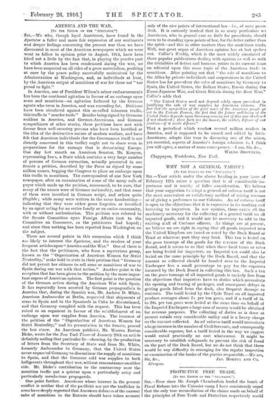WHY NOT A GENERAL TARIFF ?
[TO TaE EDITOt OF THE " SPE:TATO:Li Sin —Your article under the above heading in your issue .of February 12th raises a question that is of considerable im- portance and is worthy of fuller consideration. We believe that your suggestion to adopt a general ad valorem tariff is not the most convenient or satisfactory method of raising revenue or of giving a preference to our Colonies. An ad ralorent tariff is open to the objections that it is expensive in its working and harassing to importers. In our opinion, there exists all the machinery necessary for the collecting of a general tariff on all imported goods, and it would not be necessary to add to the etiating staff of Customs officers. • As things are at present, we believe we are right in saying that all goods imported into the United -Kingdom arc taxed• or rated by the Dock Board or Trust at whatever port they may land. This tax is levied cn the gross tonnage of the goods for the r; wane of the Dock Board, and it seems to us that when these. local taxes or rates are being levied for importers, an Imperial tax could also be levied on the same principle by the Dock Board, and that the amount so collected should be handed over to the Imperial Exchequer less a small percentage to pay for the expenses incurred by the Dock Board in collecting this tax. Such a tax on the gross tonnage of all imported goods is entirely free from the objections that importers have to duties which necessitate the opening and tearing of packages, and consequent delays in getting goods lifted from the dock, also frequent damage to contents. The tariff levied by the. Clyde Trust on all imported produce averages about 2s. per ton gross, and if a tariff of
to 20s. per ton gross were levied at the same time on behalf of the Imperial Exchequer a large sum of money would be Obtained for revenue purposes. .The collecting of duties as is done at present entails very considerable outlay and is a heavy charge on the amount collected. An ad valorem tariff would necessitate a large increase in the number of Civil Servants, and conseqeently considerable expense, but a tariff levied in the way we suggest would entail practically no cost whatsoever. It Might be necessary to establish safeguards to prevent the risk of fraud on the part of the Dock Board, but we do not think that there Would be any difficulty in arranging for the regular inspection or examination of the books of the parties responsible.—Wo are,


































 Previous page
Previous page